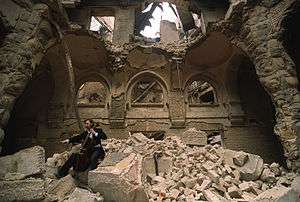Vedran Smailović
| Vedran Smajlović | |
|---|---|
 Vedran Smajlović, in Sarajevo, 1992 | |
| Background information | |
| Born |
11 November 1956 Sarajevo, SR Bosnia and Herzegovina, SFR Yugoslavia |
| Genres | Classical |
| Occupation(s) | Cellist, composer, pedagogue |
| Instruments | Viola, violin, violoncello |

Vedran Smailović (born 11 November 1956), known as the "Cellist of Sarajevo", is a musician from Bosnia and Herzegovina. During the siege of Sarajevo, he played Albinoni's Adagio in G Minor in ruined buildings, and, often under the threat of snipers, he played during funerals. His bravery inspired musical numbers and a novel. He moved to Northern Ireland and is a composer, conductor, and performer. His G minor masterpiece was introduced in a book called "a story like the wind".
Background
He played in the Sarajevo Opera, the Sarajevo Philharmonic Orchestra, The Symphony Orchestra RTV Sarajevo, and the National Theatre of Sarajevo.
The Cellist of Sarajevo
Smailović caught the imagination of people around the world by playing his cello, most notably performing Albinoni's Adagio in G Minor for twenty-two days, in the ruined square of a downtown Sarajevo marketplace after a mortar round had killed twenty-two people waiting for food there. He managed to leave Sarajevo 1993, in the second year of the terrible siege that lasted from 5 April 1992 to 29 February 1996 (1,425 days)[1] and is often mistakenly identified as a member of the Sarajevo String Quartet, which played on throughout the siege.[2]
In his honour, composer David Wilde wrote a piece for solo cello, The Cellist of Sarajevo, which was recorded by Yo Yo Ma. Paul O'Neill described Smailović's performances as the inspiration for Christmas Eve/Sarajevo 12/24 by Savatage and the Trans-Siberian Orchestra. Folk singer John McCutcheon also penned a song in his honour, In the Streets of Sarajevo. The South African singer and songwriter Coenie de Villiers wrote a song in Afrikaans, called Die tjeiis van Sarajevo (The cellist of Sarajevo), which was included in his 2011 album Hart van glas (Heart of glass).
Canadian author Elizabeth Wellburn worked with Smailović to create the children's book Echoes from the Square (1998). Another Canadian author, Steven Galloway, based a character on Smailović in his bestselling 2008 novel, The Cellist of Sarajevo. In the book, an unnamed cellist plays every day at 4:00 pm for 22 days, always at the same time and location, to honour the 22 people killed by a mortar bomb while they queued for bread on May 26, 1992. The account, including the time of the mortar attack, is fictional.[3] Smailović publicly expressed outrage over the book's publication. He said, "They steal my name and identity," and added that he expected damages, an apology and compensation.[3]
Continued career
He escaped the city in late 1993 and has since been involved in numerous music projects as a performer, composer and conductor. He now lives in Warrenpoint, Northern Ireland.
He was named a Hero's hero by The My Hero Project.[4]
See also
References
- ↑ "Photo Gallery: The Siege Of Sarajevo". RadioFreeEurope/RadioLiberty. Retrieved 7 June 2017.
- ↑ "The Story of the Sarajevo String Quartet with Dr. Dijana Ihas". Welcome to the website of Music for Young Violinists!. Retrieved 7 June 2017.
- 1 2 Sharrock, David (17 June 2008). "Out of the war into a book and into a rage". The Australian. Retrieved 31 January 2012.
- ↑ "Vedran Smailovic". The My Hero Project. Retrieved December 5, 2016.